Lawyers Demand Release Of Reporters Jailed For Revealing Mahsa Amini's Death
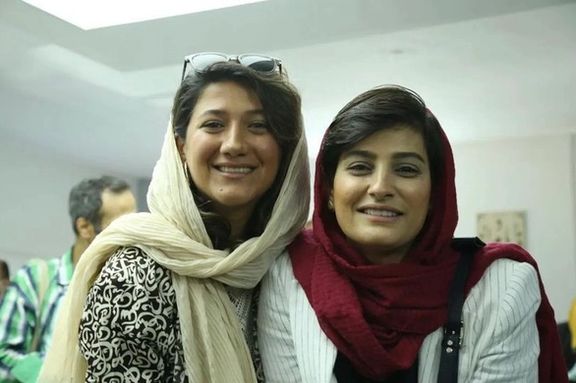
Attorneys for two Iranian journalists kept in jail for nearly a year for first reporting Mahsa Amini’s death in police custody have requested their immediate release.

Attorneys for two Iranian journalists kept in jail for nearly a year for first reporting Mahsa Amini’s death in police custody have requested their immediate release.
Niloufar Hamedi’s and Elahe Mohammadi’s lawyers submitted legal requests for their release after one year of “temporary detention”, which even according to Iran’s laws is illegal.
The two journalists – from reformist Iranian dailies Shargh and Ham-Mihan – have been imprisoned for about 350 days because the regime blames them for the nationwide protests that followed Amini’s death in hospital on September 16, 2022, after her arrest by the notorious hijab police.
The Islamic Republic is known to crack down on people who reveal corruption and wrongdoing in Iran, with authorities announcing that reporting the crimes is worse than the crimes themselves.
Hamedi reported about Mahsa Amini struggling for her life in a hospital after receiving fatal head injuries while in custody. When the 22-year-old Amini passed away, residents of Tehran began gathering around the hospital to protest and soon demonstrations spread to many cities. The Women, Life, Liberty movement that began presented the most serious challenge to the Islamic regime in its 44-year history and lasted for months.
Iran’s intelligence ministry and the Revolutionary Guard accused the two reporters of having links with the CIA and foreign governments and conspiring to agitate public opinion against the regime.
Hamedi’s attorney, Partu Borhanpur in an interview with Shargh newspaper said two months have passed since her trial was held and the court has not announced its decision, keeping Hamedi illegally in temporary detention.
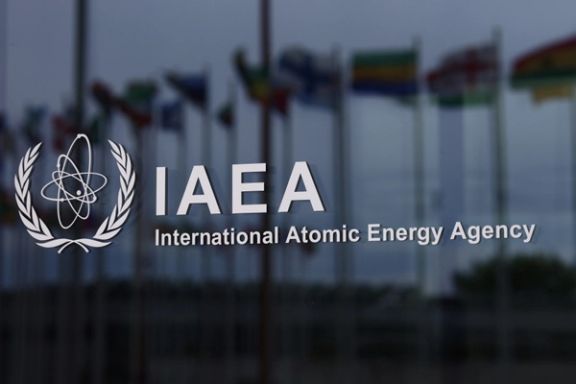
The US and three European allies have condemned Iran’s move to bar IAEA inspectors assigned to the country as another step in the wrong direction.
The United Kingdom, France, Germany -- the so-called E3 -- and the US issued a statement Monday, a few days after the UN nuclear watchdog announced that Iran has withdrawn the designation of several UN inspectors assigned to conduct verification activities in Iran under the Non-Proliferation Treaty Safeguards Agreement.
Having arrived in New York for the UN General Assembly, IAEA director Rafael Grossi told Iran International’s Arash Alaei Monday that he hopes to meet with Iranian officials “to see if they can regress” this unconstructive move. “I was very critical of this move... it was not constructive; it’s not a step in the right direction. it's not good."
He added that the only way that Iran could dispel any doubts about its nuclear program is to allow the IAEA to inspect, noting that “If they allow us to work, then there will be confidence; otherwise, it will be very complicated.”
Via a rare public statement, International Atomic Energy Agency's Rafael Grossi had decried Iran's "disproportionate and unprecedented" move on September 16, saying that it hinders IAEA oversight of Tehran's atomic activities. Tehran was showing displeasure in the face of a threat by the US and the E3 of another resolution to censure Iran for lack of cooperation with the IAEA.
In their Monday statement, the US and its allies said, “Iran’s actions will undermine the Agency’s ability to carry out its safeguards mandate effectively,” which constitutes an unnecessary blow to an “already strained relationship between the IAEA and Iran”.
Expressing concern over Iran expanding its nuclear activities, and its deliberate hampering of IAEA’s verification and monitoring activities – mandated under Iran’s NPT Safeguards Agreement, the US and E3 joined Grossi in strongly condemning "unilateral” measure.
“This is at a time when the IAEA has serious, longstanding, and unresolved questions related to undeclared nuclear materials and activities in Iran that Iran has failed to address for more than four years.”
They urged Tehran to “immediately reverse these inspector de-designations and fully cooperate with the Agency to enable them to provide assurances that Iran’s nuclear program is exclusively peaceful.”
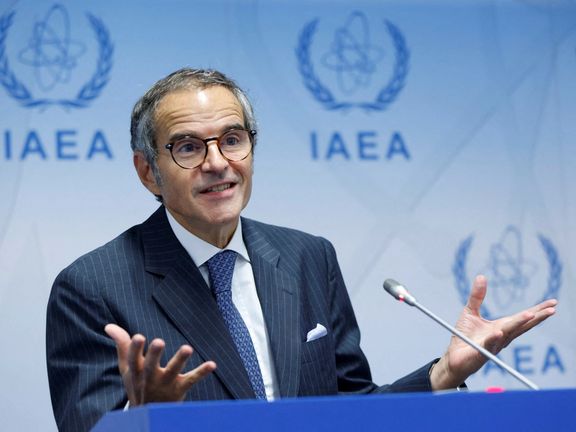
On Sunday, the European Union also urged Iran to reconsider its decision, with the spokesman for EU foreign affairs Peter Stano saying, "The European Union is highly concerned by the ... decision by Iran to withdraw the official designation of several experienced IAEA inspectors to monitor and verify its nuclear program."
"Particularly worrying is the direct and severe impact of this decision on the Agency's ability to conduct its verification activities, which includes the monitoring of the Joint Comprehensive Plan of Action. The EU urges Iran to reconsider its decision without delay," the statement said.
Earlier in the day, US Secretary of State Antony Blinken acknowledged the threat posed by Iran’s nuclear program during a meeting with foreign ministers of the Persian Gulf Cooperation Council member states, who are also in New York for the UN summit.
“We’re cooperating to deter Tehran’s aggression and destabilizing activities, including the threat posed by its nuclear program,” he said, adding, “And we’re working to uphold freedom of navigation, such as through a multinational task force that is protecting ships in the Strait of Hormuz.”
In June, the US Naval Forces Central Command hosted a two-day multilateral maritime security meeting for 90 senior military officers and diplomats from 22 nations, including GCC member-states. The counterterrorism working group and the Iran working group are two of the most active bodies set up under the umbrella of GCC-US partnership.
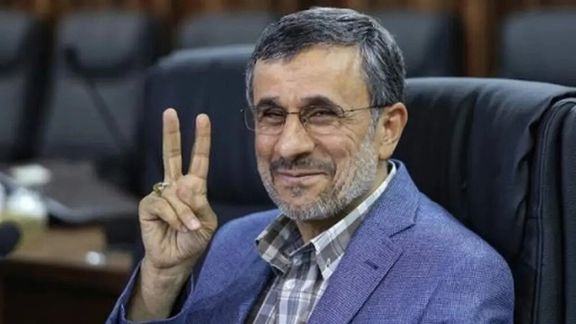
The US has sanctioned former Iranian President Mahmoud Ahmadinejad for the disappearance of a US citizen 16 years ago, while releasing $6 billion to Iran to free other hostages.
On Monday, as five Iranian-Americans held hostage in Iran for several years were allowed to leave, the United States announced designations for Ahmadinejad and Iran’s Intelligence Ministry.
The move to allow $6 billion frozen in South Korean banks due to US sanctions to be released has been criticized by Republicans, experts and many Iranian Americans as a counter-productive decision that will endanger other Americans and embolden would-be hostage takers.
The sanctions announced today are seen as a move by the administration to counter these criticisms, while Ahmadinejad holds no significant power in Iran and has been isolated by the regime. While criticizing the regime since 2017, the former president has maintained silence for more than a year.
A statement released by the State Department said the US is “designating Iran’s Ministry of Intelligence and Security (MOIS) in connection with the MOIS’s involvement in the wrongful detention of U.S citizens and former President Mahmoud Ahmadinejad for his support to MOIS.” It added, “During Ahmadinejad’s term in office, Iran’s MOIS abducted and detained Bob Levinson with authorization by senior Iranian officials.” Levinson traveled to Iran and disappeared in 2007.
The prisoners released on Monday were arrested on trumped-up charges and convicted for espionage and other security crimes in sham trials without due process of law.
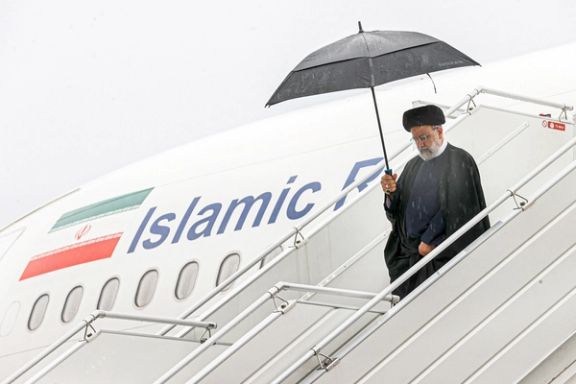
Ebrahim Raisi, the President of Iran, traveled to the United States for the second time to attend the United Nations General Assembly.
The plane carrying him touched down in New York on Monday while the airline he used, Meraj, is on the US sanctions list.
Simultaneously with the trip, a prisoner exchange between Iran and the United States took place. The journey also coincides with the anniversary of the Iranian people's uprising.
Human Rights Watch had called on government officials to question the Iranian delegation at the General Assembly regarding the suppression of protesters.
However, Matthew Miller, the spokesperson for the US Department of State, commented on issuing a visa for Raisi to attend the UN General Assembly despite his background in mass executions and human rights violations, saying, “We have an obligation as the host country to admit representatives of other countries no matter what we think of those countries' policies.”
Upon his arrival in the US, Raisi attributed the protests in Iran to the “hostile intentions” of Western nations.
Raisi had previously expressed hope that he would act in line with the "views and aspirations" of Supreme Leader Ali Khamenei. He also stated, "I will be the voice of the people at the United Nations General Assembly."
His trip to the US last year occurred just days after the regime's killing of Mahsa Amini and the beginning of popular protests.
However, without explicitly mentioning Amini’s death, he downplayed the case as a matter of little significance, with investigations ongoing.
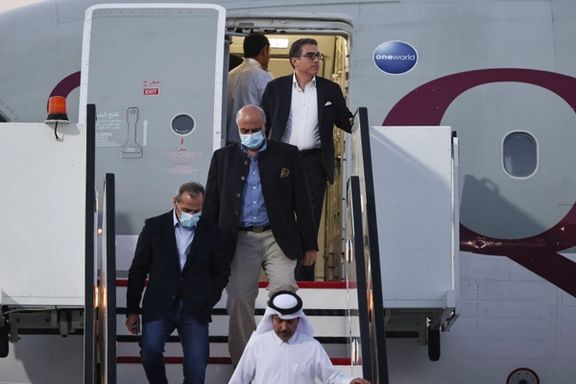
US President Joe Biden issued a statement Monday announcing the release of five Americans who were held hostage in Iran but were freed and flown to Qatar.
"Today, five innocent Americans who were imprisoned in Iran are finally coming home," the statement said and added, "I am grateful to our partners at home and abroad for their tireless efforts to help us achieve this outcome, including the Governments of Qatar, Oman, Switzerland, and South Korea."
US officials received the five freed Americans released by Tehran after they disembarked from a Qatari plane at Doha international airport on Monday, a Reuters witness said.
Secretary of State Antony Blinken said he had spoken to the US citizens after they left Iran and flew to Doha as part of a prisoner swap. "I can tell you that it was for them, for me, an emotional conversation,” he said, adding that "President Biden has demonstrated that he is prepared to make tough and difficult decisions.”
"This process, and the engagements necessary to bring it about, the freedom of these unjustly detained Americans has always been a separate track in our engagement, or for that matter our lack of engagement, with Iran. So, irrespective of what is happening or not happening with respect to a return to the nuclear agreement, we have been working independently to bring these Americans home,” he noted. "We will continue to take whatever step is necessary to deal with actions by Iran in a whole host of areas that are profoundly objectionable, and that many other countries find objectionable."
Switzerland's ambassador to Iran accompanied them on the plane to Doha, the witness added.
Earlier, the five US detainees had flown out of Iran in a swap for five Iranians held in the United States, in a rare deal between the arch enemies that also unfroze $6 billion of Tehran's funds.
Earlier in the day, Mohammad-Reza Farzin, chief of Iran's central bank announced that the $6 billion released by South Korea with authorization from the United States was converted into 5.73 billion euros and transferred Monday to six Iranian accounts at two Qatari banks.
Iran's Ministry of Foreign Affairs spokesperson has Nasser Kanaani disclosed on Monday that two of the Iranians released in the United States will return to Iran, one individual will travel to another country, and two others will continue to reside in the US.
The controversial deal, first made public on August 10, is seen as a first step toward an unwritten deal, whereby Iran will reduce high-level uranium enrichment in exchange for more of its frozen funds being released and a lax sanctions regime by Washington.
Republican lawmakers and many Iranian Americans have sharply criticized the deal, calling it the highest ransom paid in history to free five people, which will free up resources for the Iranian regime to spend on weapons and support to militant organizations.
Meanwhile, Iran’s President Ebrahim left Tehran for New York Monday to participate in the UN General Assembly. He is scheduled to hold diplomatic meetings while in New York. Critics of the Biden administration Iran policy also took issue with the decision to allow Raisi to enter the country, while Iran is still under sanctions and expanding its nuclear program.
The US dual citizens to be released include Siamak Namazi, 51, and Emad Sharqi, 59, both businessmen, and Morad Tahbaz, 67, an environmentalist who also holds British nationality. They were released from prison and put under house arrest last month.
A fourth US citizen was also released into house arrest, while a fifth was already under house arrest. Their identities have not been disclosed.
Iranian officials named the five Iranians to be released by the US as Mehrdad Moin-Ansari, Kambiz Attar-Kashani, Reza Sarhangpour-Kafrani, Amin Hassanzadeh and Kaveh Afrasiabi. Afrasiabi who was prosecuted for accepting payments from the Iranian government has apparently decided to remain in the United States.
As a first step in the deal, Washington waived sanctions to allow the transfer of $6 billion in Iranian funds from South Korea to Qatar. The funds had been blocked in South Korea because of US sanctions.
Under the agreement, Doha agreed to monitor how Iran spends the funds to ensure it goes on non-sanctioned humanitarian goods, such as food and medicine.
Meanwhile, Iran announced on Saturday that it has withdrawn accreditation for several UN nuclear inspectors, a move that intensified criticism of Biden’s Iran policy amid freeing the frozen funds. A European Union spokesman on Sunday said the EU is “highly concerned” by Iran’s decision, and asked Tehran to reconsider “without delay.”
With reporting by Reuters
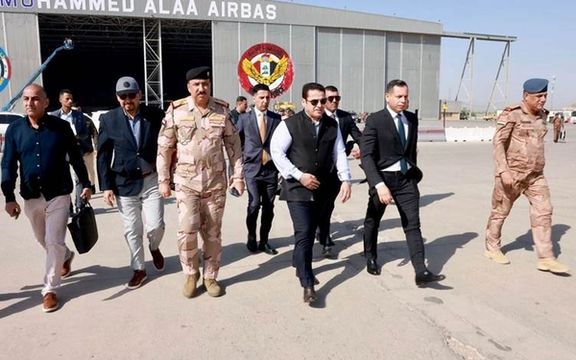
Iraq's top security official is in the Kurdistan autonomous region to oversee the implementation of a security pact with Iran aimed at disarming Kurdish opposition groups.
National security advisor Qasim al-Araji, leading a high-level security delegation, arrived in Erbil, the capital of Iraqi Kurdistan, on Monday, just a day before the September 19 deadline for finalizing the disarmament agreement.
Back in March, during a ceremony attended by Prime Minister Mohammed Shia' Al Sudani in Baghdad, then-Secretary of Iran’s Supreme National Security Council (SNSC), Ali Shamkhani, and his Iraqi counterpart al-Araji signed a joint security cooperation document aimed at curtailing the activities of Iranian-Kurdish militants.
The Kurdistan Regional Government (KRG), which has cordial relations with Tehran, has on several occasions called on neighboring countries and armed Kurdish groups to not use the region’s territory as an arena to settle scores. In July, the Iranian military threatened military action if Iraq failed to meet the deadline.
Tehran has long accused the Kurdistan Regional Government (KRG) of harboring opposition groups labeled as "terrorist" or "anti-revolutionary" and permitting them to use border areas as launchpads for attacks against Iran. These groups claim that their armed campaign aims to "defend the rights of the Kurds" in Iran. The Iranian regime has escalated attacks against Iranian Kurds sheltering in Iraqi Kurdistan, citing "separatist" Kurdish groups as instigating conflict in Iranian Kurdish cities by supporting popular protests.
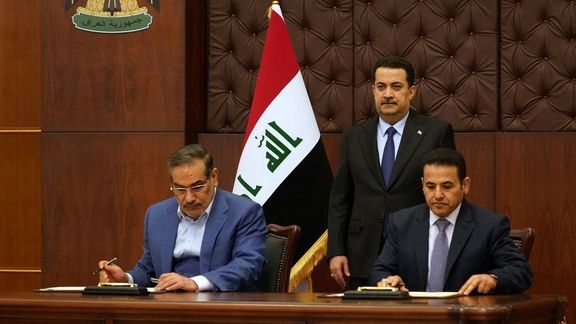
Al-Araji visited Tehran last week "under the direction of the Commander-in-Chief of the Armed Forces, Iraqi Prime Minister Mohammed Shia’ al-Sudani," to discuss tightening security at the border between the two countries. This visit came several days after the Islamic Republic's warnings that cross-border attacks would continue unless Baghdad and Erbil secured the borders. In recent weeks, he has been shuttling between Sulaymaniyah, Erbil, Tehran, and Baghdad to coordinate this effort.
During a joint press conference with his Iranian counterpart Hossein Amir-Abdollahian in Tehran on September 13, Iraqi Foreign Minister Fuad Hussein announced that several groups had already been disarmed, and arrangements were being made to set up camps at an undisclosed location for the relocation of these groups.
Waad Qado, a member of the Iraqi parliament’s security and defense committee, stated on Monday that Iraq had requested an extension of the deadline. Iranian Defense Minister Brigadier General Mohammad Reza Ashtiani, however, said on Sunday that Tehran would not extend the ultimatum, warning Baghdad of an "eleventh-hour decision" on the matter.
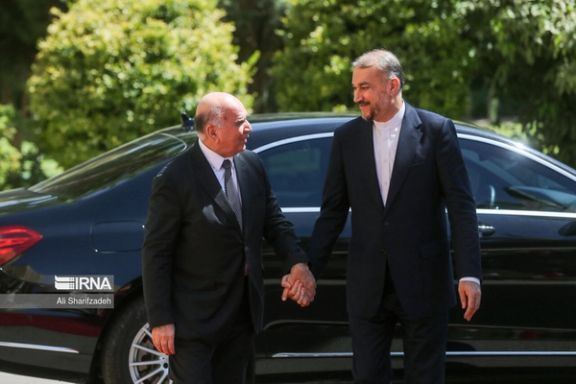
"We do not have any extension [to the deadline]. We will act in due time in accordance with the agreement made [with Iraq]," he said, warning Baghdad of a last-minute assessment of the situation before making the final decision.
The spokesman for Iraq’s Joint Operations Command also said on Sunday that government forces have begun to gain full control over all border points with neighboring Iran, emphasizing that Baghdad is fully committed to implementing the agreement. Major General Tahsin al-Khafaji added, "The step is meant to prevent the use of Iraqi soil to launch an attack on neighboring states, as emphasized in the Iraqi Constitution."
Earlier this month, the ground forces of the Islamic Revolutionary Guard Corps (IRGC) deployed forces to the northwestern borders of Iran.
In general, Kurdish parties, including Komala and the Kurdistan Democratic Party of Iran (KDPI), favor Kurdish autonomy within a federal Iran. On the other hand, Pejak (the Free Life Party of Kurdistan), an affiliate of the Kurdistan Workers’ Party, or PKK, which originated in Turkey but is also based in northern Iraq, generally advocates for a unified, independent Kurdistan uniting Kurds in Syria, Iraq, Turkey, and Iran.






